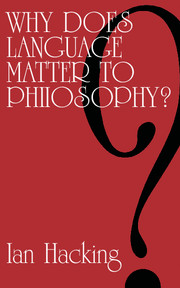6 - Noam Chomsky's innatism
Published online by Cambridge University Press: 05 November 2012
Summary
We now pass over two centuries of vivid and intense philosophical speculation. We leave the seventeenth century, the era of ideas, and find ourselves in the early twentieth century, the time when ‘meanings’ seem to preoccupy philosophy. The remarks of Frege quoted in the preceding chapter indicate what has happened, quite universally. He cares about Sinn, public meaning, the transmitter of the store of thoughts from one generation to the next. The associated idea, private mediator between the lonely ego and the larger world, is of no interest at all. As a transition between the seventeenth-century world and the recent one, it is convenient to start with a deliberate throwback. In the past decade the linguist Noam Chomsky has revived an old controversy about innate ideas. I shall try to describe some of the roles it played in seventeenth- century thought, and how Chomsky tried to redeploy it.
Although immense passions have been raised on either side, as much in 1960 as in 1690, it is often obscure, to the bystander, exactly what is at issue. It is almost as if the phrase ‘innate ideas’ were a symbolic masthead, of no importance at all in itself, but furnishing a rallying point for embattled legions who are fighting about something far more important.
- Type
- Chapter
- Information
- Why Does Language Matter to Philosophy? , pp. 57 - 69Publisher: Cambridge University PressPrint publication year: 1975
- 1
- Cited by



